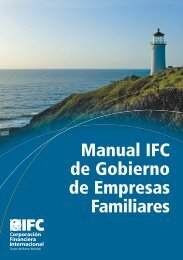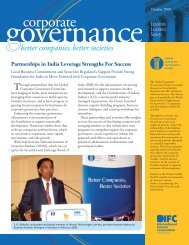Overview of Corporate Governance Issues for Co-operatives - IFC
Overview of Corporate Governance Issues for Co-operatives - IFC
Overview of Corporate Governance Issues for Co-operatives - IFC
You also want an ePaper? Increase the reach of your titles
YUMPU automatically turns print PDFs into web optimized ePapers that Google loves.
as in<strong>for</strong>mal sector organisations (ILO 2000). The same period also witnessed the hugegrowth in micro finance institutions linked to NGOs. The attention <strong>of</strong> policymakers,academics and donor agencies has been predominantly focused on NGO micro financeinstitutions.Fortunately this is now beginning to be evidenced by the ongoing research programmeinto CFIs mentioned previously and a smaller initiative to survey co-operative provision<strong>of</strong> micro gap insurance commissioned by CGAP. This research is still very much in itsearly stages.However CGAP has recently produced a briefing note outlining the main governancechallenges facing credit unions in the developing world. They include a lack <strong>of</strong> adequateparticipation in decision-making structures by members. This can result in dominance <strong>of</strong>the co-operative by community elites who then use the funds to secure their ownposition. The case <strong>of</strong> a railway SACCO is cited where the directors facilitated privilegedloans to their own supporters. A second problem occurs when board members continueto exercise operational control even after pr<strong>of</strong>essional managers have been appointed(CGAP 2005).The absence <strong>of</strong> clear and distinct roles <strong>for</strong> paid management and boards is also cited asa major problem in a separate paper <strong>for</strong> GCAP, ’Micro Insurance Series Good and BadPractice’, submitted by the International <strong>Co</strong>operative and Mutual Insurance Federation.Worst practices among insurers have happened when there has been conflict orcollusion with management by boards. A further paper in the same series reviews theinsurance services provided by the Malawi Savings and Credit <strong>Co</strong>-<strong>operatives</strong>. Herethere is also an emphasis on effective training <strong>for</strong> members as well. Training sessionstypically cover issues such as what is a co-operative and the rights and responsibilities<strong>of</strong> members (ICMIF 2005).<strong>Co</strong>-operative development agencies and sectoral bodies such as the World <strong>Co</strong>uncil <strong>of</strong>Credit Unions (WOCCU) are working to improve governance standards among creditunions. A series <strong>of</strong> good practice guidelines and governance codes have beendeveloped and relevant training programmes developed and delivered (WOCCU 2006).They also promote the <strong>for</strong>mation <strong>of</strong> national associations to advocate on behalf <strong>of</strong> theirmembers, influence policy and demand responsive governance from local and stateentities. WOCCU shares CGAP’s concern with the need to raise standards <strong>of</strong>governance <strong>for</strong> boards:Good governance stems from clearly defined roles and responsibilities <strong>of</strong> theboard <strong>of</strong> directors, committees and senior managers. It also stems from codes <strong>of</strong>conduct which directors and staff at every level <strong>of</strong> the institute sign on to andrespect in the completion <strong>of</strong> their tasks. Sound bylaws and policies seek to avoidconflicts <strong>of</strong> interest and provide mechanisms <strong>for</strong> dispute resolution where they doarise. While many factors contribute to the governance <strong>of</strong> an institution, goodgovernance begins and ends with the board(http://www.woccu.org/best_practices/index.php?sec_id_view=12)Page 30


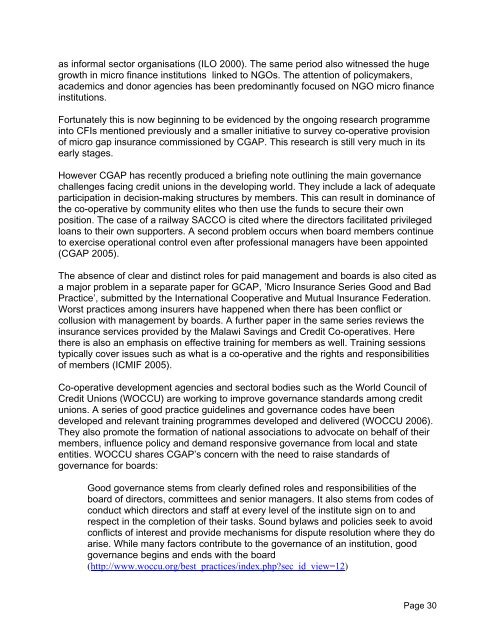
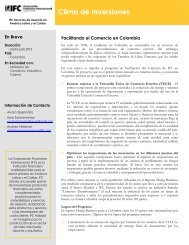
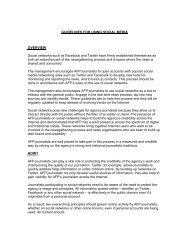
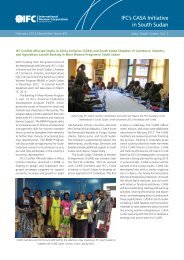
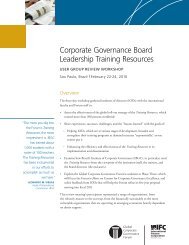

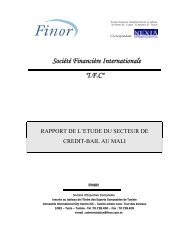
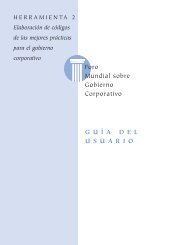
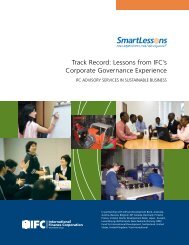
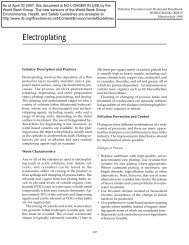
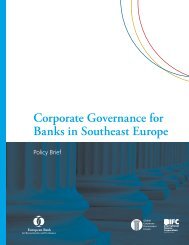
![Print a two-page fact sheet on this project [PDF] - IFC](https://img.yumpu.com/43449799/1/190x245/print-a-two-page-fact-sheet-on-this-project-pdf-ifc.jpg?quality=85)
